Fed cuts rates for third time, but Powell signals higher bar for further cuts
I don’t make a habit of pumping the most frustrating stock sector on the planet just for the sake of it. I have made a habit of discussing why, since 2003, the macro market backdrop has been adversarial to gold stocks much more often than not. By extension, internal indicators like the HUI/Gold Ratio have rightly been long-term bearish.
As you can see, the HUI/Gold ratio made a top in 2003 and has been down and flat ever since. Personally, I believe it made a double bottom earlier this year. I don’t believe that because I want to (even though I do want to). I believe it because of macro developments currently in play.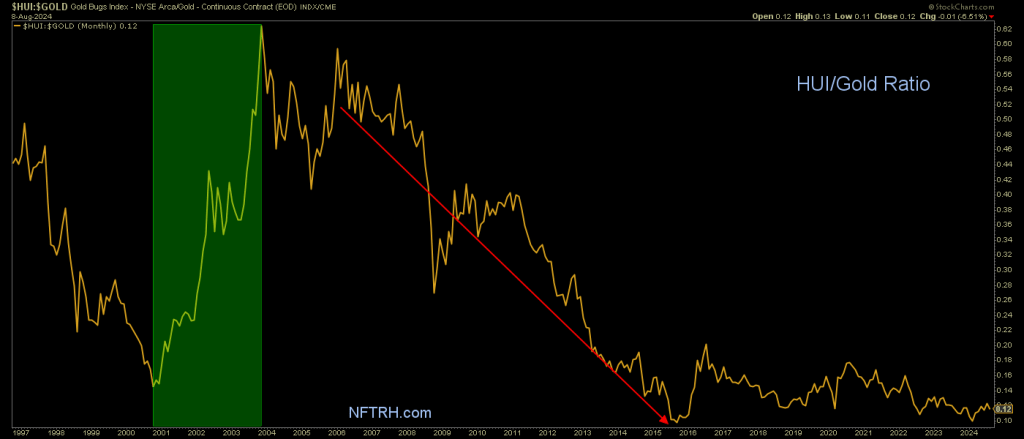
Before we get into that, let’s grab a short-term view of the HUI/Gold ratio, which is intact to that secondary low, registered on February 28 of this year. Those who want an internal technical indication on the sector’s near-term prospects should keep an eye on this indicator. As of market close on August 8 it is intact to the rally, above the June low.
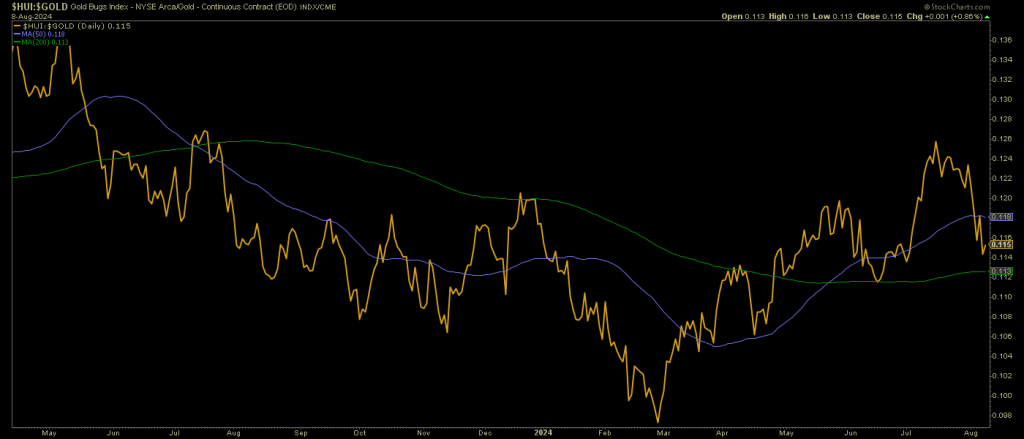
But why is the macro aligning differently for gold stocks this time, as opposed to the multitude of other times that gold bug hopes were raised and then summarily dashed? Let’s discuss.
These bullet points explain the reasoning:
- Gold is not a speculative instrument. It is a heavy monetary substance of value. An anchor. Its price is marked up relative to cyclical assets when confidence in the financial system is low, and down relative to those assets when confidence in the system is high.
- Gold is less effective than many other assets (e.g. stocks, copper/industrial metals, etc.) when inflation created by monetary and/or fiscal policy is working to the benefit of the economy, which save for a few cyclical bear markets of the last quarter century, has been the case.
- Hence, expecting gold stocks to leverage gold’s relative performance to the upside (a rising HUI/Gold ratio) in that environment is futile. With gold performing marginally at best in relation to cyclical assets during the reign of the policy-stoked “everything bubble”, the miners had little positive leverage to gold and the HUI/Gold ratio spent the vast majority of the bubble years declining. As it should have.
In reference to the question above, it is different this time, in my opinion, because both monetary (Fed) and fiscal (government) inflationary operations will be hindered significantly by the implications of the chart below. No single indicator tells the whole story, but this elegant picture does tell an important story. It is a story of license being implied by the bond market, allowing policymakers to inflate at will each time long-term yields busted downward in a deflation scare. Dramatic examples were Q4, 2008 and Q1, 2020.
In essence, for policymakers and the Keynesian system itself, it was “inflate or die”. They routinely chose “inflate” because the bond market was not only permissive of inflation, it was demanding it (since our modern system is pretty much run on inflation, AKA the creation of money out of nowhere and the manipulation of money supplies).
As a side note, I am expecting a continued decline in Treasury yields, which would be a tailwind for gold and miners, but also potentially for those touting an economic “soft landing” and a stock market resurgence before the coming bear market engages. I am also expecting the trend change in Treasury yields to hold. The days of 1% to 2% on the yield, begging for inflationary policy are over. The up-turning moving average limiters will be an epic battleground if/as yields continue to decline in the near/intermediate-term.
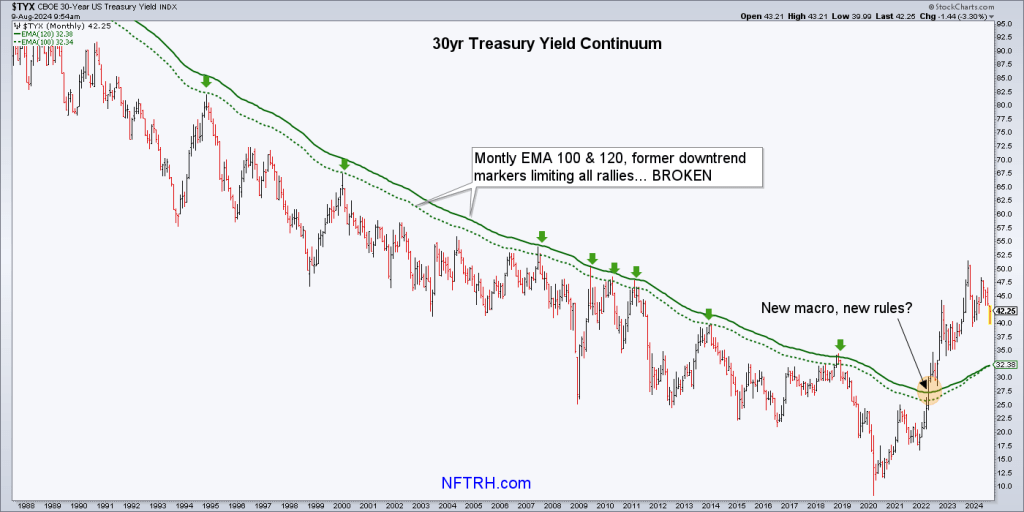
The gold stock sector is not currently unique as it rallies and corrects more or less in line with most other asset markets. But the main point here is that if policymakers try to push the panic button they’ve routinely pushed at every sign of systemic stress since Alan Greenspan introduced the age of Inflation on Demand in 2001, the results will not be the same as the previous decades of down-trending yields (disinflationary macro signaling). That now defunct yield downtrend was the license to inflate at will during many years of the bubble.
My bet is that the panic button is going to short out next time. If they try to inflate with this much unwinding debt in the system, it’s not going to be pretty from a Stagflationary standpoint. If they do nothing, we may finally have a deflationary liquidation from which the system as we know it will not come back.
Back on the gold stock macro, and with reference to the bullet points above, gold is working on flipping the macro counter-cyclical and anti-cyclical inflation. This weekly chart shows gold still battling to assert over stock markets (give it time), but breaking out vs. commodities, including crude oil, which is an important fundamental consideration for the gold mining industry, and copper, which is THE cyclical metal.
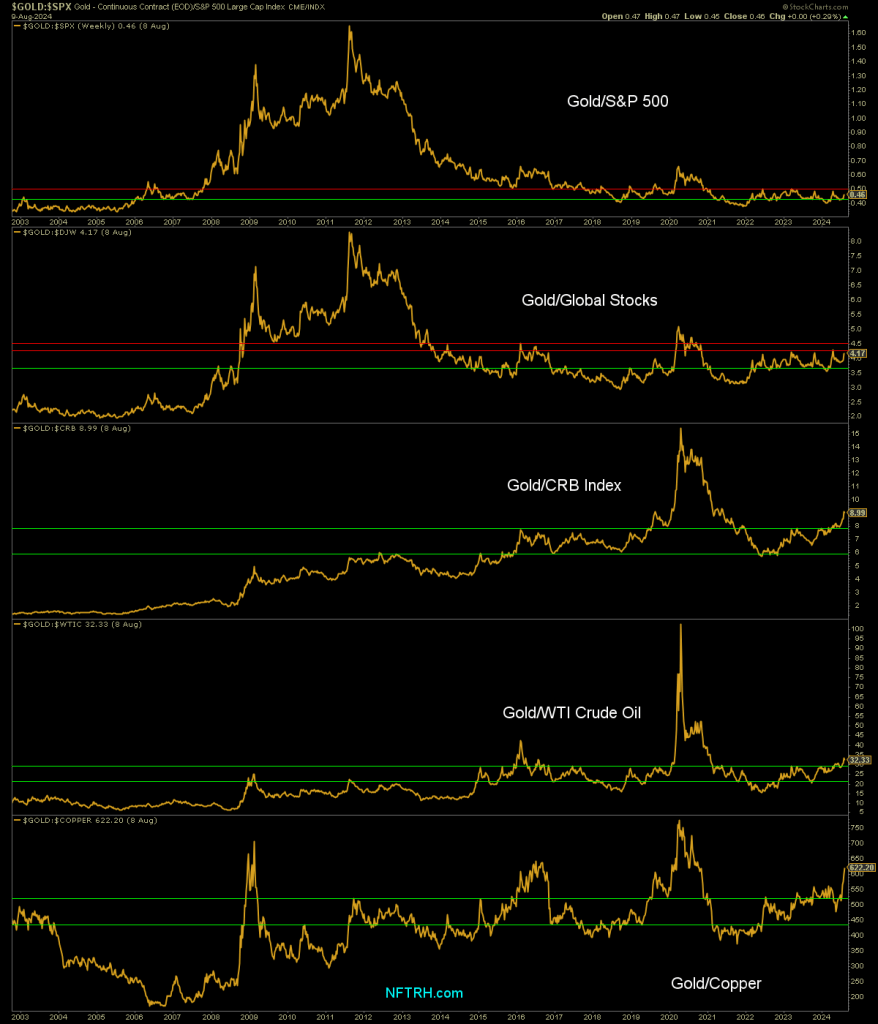
My long-held view is that a counter-cyclical macro and in Bob Hoye’s words, a “post-bubble” macro needs to engage for gold stocks to be uniquely positioned for positive performance. When the stock market bear begins and gold busts out vs. stocks (regardless of what its nominal price is doing), the post-bubble macro will finally be in play.
One indication we have used in NFTRH to guide us into the new macro with respect to gold stocks is the Gold/RINF ratio, in essence the relative performance of gold to a gauge of inflation expectations. Unlike for much of the previous 20 years, gold miners (HUI) are actually traveling a similar road as gold’s performance vs. inflation expectations.
Historically over the last 2 decades, every time that deflation scares were met with inflationary monetary/fiscal policy, gold stocks would lead the markets out of the abyss, only to soon begin greatly under-performing as the inflation took hold and began propping the economy (the mal-investment that this created is beyond the scope of this article). But what if, as expected, there is no cyclical inflation coming to the rescue of the economy in the new macro? Gold stocks are currently traveling in positive correlation with disinflationary/deflationary macro signaling. If that signaling becomes chronic, so too should the gold stock bull be lengthy.
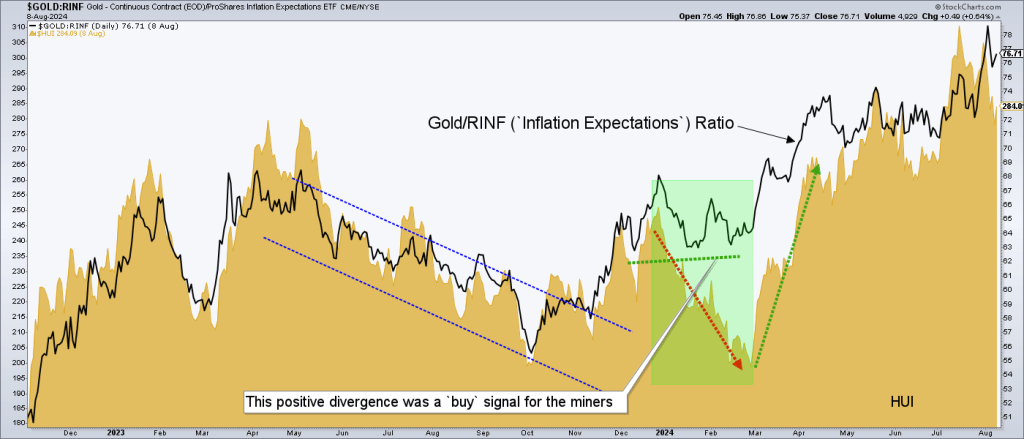
There are many more technical, fundamental and internal indications to watch as the process evolves, but the above represent a picture of a macro backdrop on its way to a condition that is going to surprise many when gold stocks rally and, unlike the previous two decades, do not stop out-performing any time soon.
There is a well established narrative that you don’t invest in gold stocks; you trade them. But that narrative was forged against a macro backdrop quite unlike the one we are transitioning to.
